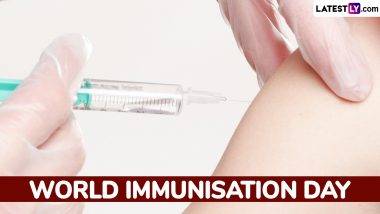It’s World Immunization Week 2019, a seven-day observance dedicated to vaccine awareness. Before the advent of vaccines, diseases ran rampant, infecting, maiming and killing people by the thousands. Thanks to global immunisation efforts, many dangerous diseases like polio and smallpox have virtually disappeared from the face of the earth. However, some others like measles have been slowly making their way back after being eradicated. The reason why some of the eradicated diseases resurfaced is due to myths and misinformation about vaccines. Recent years have seen an increase in anti-vaxxers who oppose vaccines on the grounds of safety, saying they contain toxic metals.
But most of these concerns have no basis in science. Here are some of the most frequent myths about vaccines busted.
1. “Vaccines Contain Toxic Metals Like Mercury, Aluminum”
Vaccines do contain additives for multiple purposes. Two of these are mercury and aluminium. But contrary to what anti-vaxxers think, they don’t have a toxic effect in the body and are considered safe. Can Your Child Be Allergic to Vaccines? You Must Know These 5 Things about Vaccine Allergies.
Mercury is present in vaccines in the form of thimerosal, a preservative. There’s no evidence of an adverse reaction caused by low doses of thimerosal, except for redness and swelling at the site of injection.
Aluminium salts are used as adjuvants, which increase the efficiency of the vaccine by strengthening the immune response. They have been used safely in vaccines for over 70 years.
2. “Diseases Have Disappeared Not Because of Vaccines, But Hygiene”
Anti-vaccine literature often says that it’s not the vaccines that caused the eradication of diseases but sanitation and hygiene. While improved living conditions and nutrition have brought a drop in disease incidences. But according to WHO, the real permanent reduction in the rate of measles only started in 1963 when vaccines began to be used widely. 4 Vaccines That Should Be on Every New Born’s Chart.
3. “People Who Are Vaccinated Still Get Diseases”
Many anti-vaxxers argue that people who are vaccinated still get sick. There’s a grain of truth, but does not imply that vaccines are ineffective. No vaccine is 100 percent effective.
Vaccines are basically dead or weakened bacteria or virus that are introduced into the body to strengthen its immune response. In some individual cases, certain people don’t develop immunity against them. But vaccines do work in the case of 85 to 95 percent of recipients.
Only one percent of those who are vaccinated don’t get complete immunity. But 100 percent of those who are unvaccinated are vulnerable to the disease.
4. “Vaccines Have Long and Short-Term Side Effects and Even Cause Death”
Vaccines are safe despite claims to the contrary by many anti-vaccine publications. According to the World Health Organization, vaccine complications are usually minor and temporary. General adverse reactions include a sore arm or a mild fever, which can be controlled with medications.
What is World Immunization Week? (Watch Video):
Serious complications and deaths due to vaccines are so rare that the risk cannot be assessed statistically. According to Dr Om Shrivastava, Consultant – Infectious Diseases and Immunology, the incidences of deaths are as less as 0.1 – 0.5 percent. In most cases, supposed vaccine deaths are found to be caused by unrelated factors upon investigation.
5. “Since the Disease Has Been Eradicated, My Child Need Not Be Vaccinated”
While it’s true that vaccines have helped us eradicate dangerous diseases, it doesn’t necessarily mean that there’s no need for vaccines anymore. Some of the eradicated diseases may be prevalent in other parts of the world.
An unvaccinated person can be exposed to the disease either during travel or from exposure to other travellers who bring the diseases into any country. If the community isn’t immunised, the diseases can spread rapidly across the population.
6. “Multiple Vaccines Can Overload The Immune System”
Available scientific data shows that there’s no harm in giving multiple vaccines to the child. There’s no adverse effect on the immune system at all. WHO states: “…studies have shown that the recommended vaccines are as effective in combination as they are individually, and that such combinations carry no greater risk for adverse side effects.”
7. “Autism and Vaccines Are Related”
The biggest controversy to plague vaccines is the autism angle. A study by Andrew Wakefield in the Lancet, which has now been junked, observed a seemingly positive correlation between autism and vaccines. Thimersol, a preservative used in the vaccine, was earlier considered the culprit. But a 2013 CDC study showed that the substance does not cause autism spectrum disorder. Multiple studies have gone on to show that the connection between the two was unfounded.
(The above story first appeared on LatestLY on Apr 25, 2019 06:31 PM IST. For more news and updates on politics, world, sports, entertainment and lifestyle, log on to our website latestly.com).













 Quickly
Quickly




















